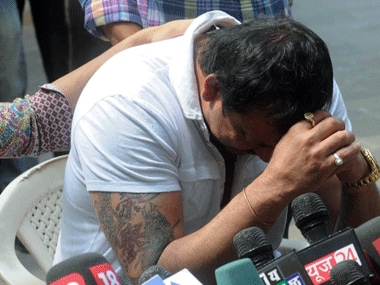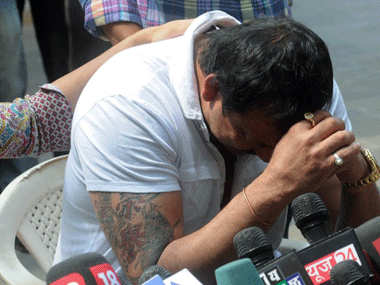After questions being raised from several quarters about the repeated furloughs granted to actor Sanjay Dutt, Maharashtra’s Home Department has finally decided to amend the laws guiding furloughs. According to a
Times Of India
report, a meeting was held by senior officials of prison, home and law departments to discuss the amendment of furlough laws and to simplify them. [caption id=“attachment_2055591” align=“alignleft” width=“380”]
 AFP[/caption] Furloughs are usually 14 days long and granted on the basis of a police report. For an extension, the inmate has to again file a separate report. However, as per the revised laws, this will not be the case. A report of 28 days (14 initial days and a 14 day extension) will be filed together when a prisoner first applies for a furlough. Once the inmate is granted the furlough, he/she will not have to file a fresh report, if he/she wants to seek an extension and can ask it for directly. Principal secretary (prisons) Vijay Satbir Singh told
Times of India
that the furlough for prisoners who are doing time of over 5 years will also be reduced to 21 from 28 days. However, the prisoners who are incarcerated for a shorter period will be granted a 28 day long furlough. While it is unclear whether Dutt will benefit due to the revised law, the actor has faced much criticism for seeking furloughs repeatedly. This year, Dutt rang in the new year with his family as he was out on a 14-day furlough. The actor also applied for an extension, but his application was rejected. Earlier, Dutt was released on furlough in October 2013 for two weeks for health reasons, followed by a similar leave in December 2013, to tend to his ailing wife, Maanyata, attracting charges of favouritism. In February last year, the Bombay High Court had commented on the diligence in granting the actor’s requests for furlough that was not visible in case of other convicts who applied for leave. Dutt was convicted in 2007 for illegal possession of an AK-56 assault rifle during the 1992-1993 Mumbai communal conflagration before the March 12, 1993 serial bomb blasts in the city and sentenced to six years jail. The Supreme Court had upheld the conviction in 2013 but reduced the sentence to five years, less the time already served. Dutt surrendered on May 16, 2013, and was moved to the high-security jail in Pune to serve the remainder of his 42-month sentence.
AFP[/caption] Furloughs are usually 14 days long and granted on the basis of a police report. For an extension, the inmate has to again file a separate report. However, as per the revised laws, this will not be the case. A report of 28 days (14 initial days and a 14 day extension) will be filed together when a prisoner first applies for a furlough. Once the inmate is granted the furlough, he/she will not have to file a fresh report, if he/she wants to seek an extension and can ask it for directly. Principal secretary (prisons) Vijay Satbir Singh told
Times of India
that the furlough for prisoners who are doing time of over 5 years will also be reduced to 21 from 28 days. However, the prisoners who are incarcerated for a shorter period will be granted a 28 day long furlough. While it is unclear whether Dutt will benefit due to the revised law, the actor has faced much criticism for seeking furloughs repeatedly. This year, Dutt rang in the new year with his family as he was out on a 14-day furlough. The actor also applied for an extension, but his application was rejected. Earlier, Dutt was released on furlough in October 2013 for two weeks for health reasons, followed by a similar leave in December 2013, to tend to his ailing wife, Maanyata, attracting charges of favouritism. In February last year, the Bombay High Court had commented on the diligence in granting the actor’s requests for furlough that was not visible in case of other convicts who applied for leave. Dutt was convicted in 2007 for illegal possession of an AK-56 assault rifle during the 1992-1993 Mumbai communal conflagration before the March 12, 1993 serial bomb blasts in the city and sentenced to six years jail. The Supreme Court had upheld the conviction in 2013 but reduced the sentence to five years, less the time already served. Dutt surrendered on May 16, 2013, and was moved to the high-security jail in Pune to serve the remainder of his 42-month sentence.
After outrage over Sanjay Dutt's repeated bails, Maha to change furlough laws
FP Archives
• January 20, 2015, 17:04:27 IST
After questions being raised from several quarters about the repeated furloughs granted to actor Sanjay Dutt, Maharashtra Home Department have finally decided to amend furlough laws.
Advertisement
)